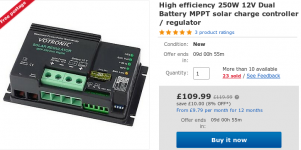mblinko
Full Member
- Messages
- 78
Ditto, good kitI fitted this which was recommended by some one here..
Just ran new cable's back to engine battery.
Never had days trouble with it.
View attachment 61967
Ditto, good kitI fitted this which was recommended by some one here..
Just ran new cable's back to engine battery.
Never had days trouble with it.
View attachment 61967
Thanks for adding that qualifier David, and of course you are absolutely correct.
Well none of the technical talk is selling that concept. I'm getting simpler with age. Flick a switch me and it either works or doesn't. If it doesn't work ask someone who knows.Best thing you will ever do on a van and so simple.
Parasitic drain from Alarms/Multimedia Units/Central locking, natural self discharge of starter battery etc. It's a bit late when the flat battery has taken out the ECU and the fault is not repairable, as I know to my considerable cost. In my case, there was also a reverse feed from Starter Battery to Leisure Battery dating back to 2016 when the Selling Dealer cross wired the rear camera and the Pioneer, but that has been traced and corrected nowThere are no dual MPPT solar controllers on the market, but there are a few that charge the hab battery using MPPT and trickle-charge the engine battery in an unregulated way.
Any solar controller under £30, dual or not, is not going to be an MPPT one, though you can buy PWM ones with MPPT written on them.
If you're not sure whether MPPT is worth paying for, the answer is that it is.
What is far less clear is why you need to charge your engine battery from the solar panel. Motorhomes have solar panels to replace power used by the habitation systems. The engine battery shouldn't be used. A motorhome engine battery has no more load on it than the base vehicle has when it's a van.
If your starter battery is running flat, that's a fault that should be fixed. A solar charger won't fix it: it'll just hide the symptoms. If the battery isn't running flat, why add a solar charger?
I usually ask someone who thinks they know ... And then the fun beginsWell none of the technical talk is selling that concept. I'm getting simpler with age. Flick a switch me and it either works or doesn't. If it doesn't work ask someone who knows.
The reverse feed was traced, and the starter battery was replaced with a 3rd new one in 4 weeks when the ECU was replaced. The parasitic drain is seen by Dealers and Owners as just part of the process, especially the Pioneer system, and I know a couple of M/Home owners with quite new Vans that have suffered from Starter Battery drain, and the AMT 12 has provided a simple solutionReverse feed... As I said, a fault that should be fixed, not hidden.
The parasitic drain from the ECU is normal for a van. The engine battery is supposed to cope with that. Alarm? If not the standard vehicle maker's install, it ought to be on the hab bank.
And if the battery is defective, solar really isn't the solution.
Yes, it's up to people to choose what they want to install, but we should not promote the myth that it's necessary, or even a good idea, to routinely charge the engine battery from solar.
FWIW, my motorhome's engine battery is currently being charged from solar, but that's because there's a spare solar charge system where it is parked and the battery is almost ten years old. I don't want to replace that until the pandemic restrictions are gone.
Oh yes as a female driver I have met many. Best examples were back in the 80's when we could still get a wheel off without a garage being needed or fill with water without the RAC. The amount of 'help' from people who would have happily put water in the brake fluid was frightening.I usually ask someone who thinks they know ... And then the fun beginsThat's the point at which I discover that 'expert' is really 2 words 'ex', as in 'was'; and 'spurt' as in 'drip' ...
And
he still knows more than I do!
Steve
Because batteries sitting for long times go down hill, many folk don't have a charge point where they store the van if only used a few weeks a year, apart from bringing batteries home then duel solar is the way to go, my votronic works very well.There are no dual MPPT solar controllers on the market, but there are a few that charge the hab battery using MPPT and trickle-charge the engine battery in an unregulated way.
Any solar controller under £30, dual or not, is not going to be an MPPT one, though you can buy PWM ones with MPPT written on them.
If you're not sure whether MPPT is worth paying for, the answer is that it is.
What is far less clear is why you need to charge your engine battery from the solar panel. Motorhomes have solar panels to replace power used by the habitation systems. The engine battery shouldn't be used. A motorhome engine battery has no more load on it than the base vehicle has when it's a van.
If your starter battery is running flat, that's a fault that should be fixed. A solar charger won't fix it: it'll just hide the symptoms. If the battery isn't running flat, why add a solar charger?

It only does a small panel, if you want to add more its no good, always buy bigger so you can add more or larger panel down the line, I think 200w is as small as id go knowing what I do now.This is better.
12V solar panels charging kits for caravans, motorhomes, boats, yachts, marine
12V solar panel solar charging kits for motorhome caravan boat campervan yacht marine off-gridwww.photonicuniverse.com
For anyone who expects to want to spend any time off-grid, the approach I take is:It only does a small panel, if you want to add more its no good, always buy bigger so you can add more or larger panel down the line, I think 200w is as small as id go knowing what I do now.
I don't need bigger to charge a few devices.It only does a small panel, if you want to add more its no good, always buy bigger so you can add more or larger panel down the line, I think 200w is as small as id go knowing what I do now.
Not had a problem since I fitted one of theseBecause batteries sitting for long times go down hill, many folk don't have a charge point where they store the van if only used a few weeks a year, apart from bringing batteries home then duel solar is the way to go, my votronic works very well.View attachment 62013
